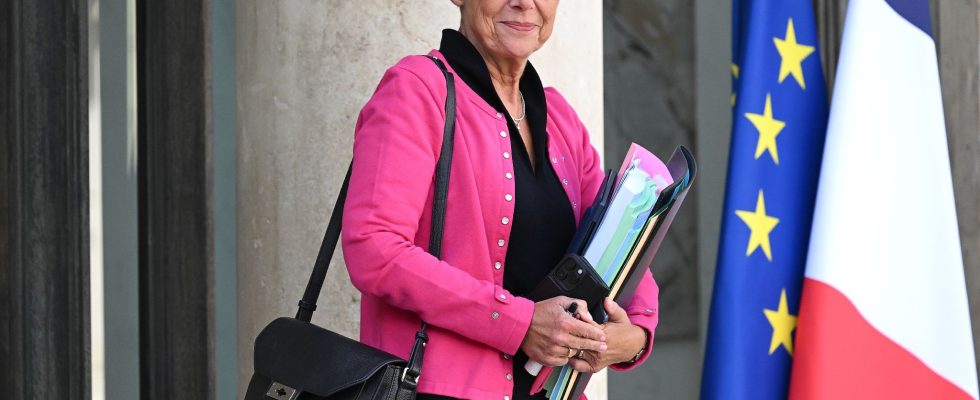Prime Minister Elisabeth Borne opens a social conference on low wages this Monday, October 16, which risks being held in a tense context. The cause: high inflation and differences with the social partners on numerous issues. There will be, around the table, six union organizations (CFDT, CGT, FO, CFTC, CFE-CGC, and Unsa) and six employers (Medef, U2P, CPME, Fnsea, Fesac and Udes). They will meet at the Economic, Social and Environmental Council (Cese) in Paris, with a plenary session in the morning, workshops in the afternoon and a closing plenary. To absent subscribers: the Solidaire union, which considers the proposals presented upstream by the government “insufficient”.
Despite the assassination on Friday of teacher Dominique Bernard in Arras, the head of government wanted to maintain this major rally. “The shock and the emotion are there but, we have agreed, we cannot give in or put our country at a standstill in the face of terrorism,” said Élisabeth Borne in an interview with La Tribune Sunday, this October 15. In order to prepare for this social summit, the head of government received unions and employers’ organizations in turn. “The Prime Minister told us that there would be announcements, we take her at her word,” expects the head of the first union, the CFDT, Marylise Léon.
Last Friday, ahead of the social conference, unions and youth organizations demonstrated “against austerity and for an increase in salaries, pensions and gender equality”. “We are very worried on a social and economic level, because there are more and more workers who cannot make ends meet,” warned the general secretary of the CGT, Sophie Binet. But the ranks were thinner than when they protested against pension reform six months ago.
“We renewed the dialogue in July. We are continuing it today on the priority of the French: purchasing power,” assured Elisabeth Borne. Since this crisis, the social partners have agreed on a “social agenda” of tripartite negotiations (with the government) on the employment of seniors, career paths or arduousness. “There is a common desire to strengthen social democracy, to have a moment of unity,” added the Prime Minister.
However, there is one downside: the conference will be held against a backdrop of deep disagreement between the social partners and the government on the private supplementary pension schemes (Agirc-Arrco) and unemployment insurance (Unedic). The State wants to drain them to fill the deficit in the general pension system or to supplement France Travail, the new public employment service. A subject that should weigh heavily in discussions.
A High Remuneration Council?
Three themes will be on the menu: “conventional minimums, classifications and career paths”; “part-time and short contracts”; “exemptions from contributions, activity bonuses and reduction in remuneration”, according to Matignon. Note that this conference is being held in an overall context of unions losing weight: in 2021, only 11.2% of companies with 10 or more employees had at least one union delegate, representing 57.5% of employees in the sector. field, underline The Conversation.
Under pressure from several unions, the theme of gender equality was added at the last minute – a subject on which the executive was pinned down, in mid-September, by the Court of Auditors. For equal working hours, women earn on average 14.8% less than men in the private sector, according to INSEE. But the difference can exceed 25% if we take into account the number of hours worked – because more than a quarter of women are employed part-time, compared to 7.5% of men, according to the Ministry of Labor.
On the question of salaries, the head of government will propose “the establishment of a High Council for Remuneration”. “Certain branches have not reviewed their pay scale for more than twenty years. We want to revitalize negotiation in these sectors,” she explains in the columns of the newspaper The gallery. This new body will be responsible for “illuminating the situation and proposing answers”.
Sophie Binet says she is waiting for “restrictive measures”, such as the indexation of salaries to prices, “the only effective mechanism to maintain purchasing power”, she declared in the program Questions Politiques. A proposal also put forward by FO which should be rejected by the government. In France, only the minimum wage is indexed to price increases.
“Social dialogue does not start with constraint”
According to the CFTC, the executive also shows “a lot of caution” on one of the main demands of the unions, namely “conditioning” the tax exemptions granted to companies on the increase in wages. They believe that these measures act as a “low-wage trap”, since the closer the salaries are to the minimum wage, the greater the exemptions. But Medef is hostile to it. Its new president Patrick Martin even said he was ready to challenge it legally. “Sanctioning a company that is up to date with its salaries, on the grounds that its sector is not, is legally impossible,” he said.
In addition, as the minimum wage increases faster (with inflation) than the rest of wages, certain minimums in professional sectors are caught up, generating, according to the unions, a “slump” in wages. In other words, even with several years of seniority, the employee remains at the minimum wage. “Some people start their professional lives on minimum wage and are still there for years later, it’s discouraging!” recognizes the head of government, who calls “collectively” to “give them perspectives”. Around 60 professional branches currently have minimums below the minimum wage, instead of 145 in May, according to the Ministry of Labor.
For her part, the head of government refuses to put pressure on companies: “Social dialogue does not begin with constraint. We want to encourage, drive, follow progress.”
